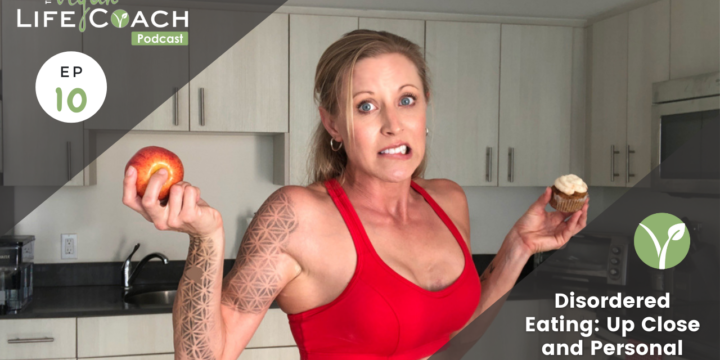Today’s topic is something many of you, our listeners, vegan and vegan-curious alike, have expressed is a struggle… disordered eating.
LISTEN/WATCH
Subscribe: Apple Podcast | Stitcher | Spotify | YouTube
*Links mentioned in the episode are at the bottom of this page.
First, please know you’re not alone in your struggle. In fact, statistics show 50-70% of Americans demonstrate a problematic relationship with food. Stephanie and I agree that well over 70% of our clients would say they find themselves in some really disordered eating cycles.
People are often surprised to discover that I hid my tumultuous relationship with food for well over a decade. I briefly tell my story in this episode.
We also discuss the difference between disordered eating and an eating disorder. An eating disorder is a diagnosis, and Stephanie describes how she believes her eating disorder really grew out of some very early disordered eating patterns.
Stephanie started restricting her food as early as 9 years old. She internalized a lot of messages that she was receiving. She was a girl that was tall and big for her age, hitting puberty very early, and she heard people’s well-intentioned words as truth… that something was wrong with her.
By the time she was 14, she was actively in binging and purging cycles, meeting the criteria for Bulimia. These cycles lasted until she got to the point where her life was completely unmanageable, and treatment was a necessity.
Disordered eating does have some of the same markers as an eating disorder, like anxiety about eating certain food groups, obsessive calorie counting, a rigid approach to exercise or eating patterns, and this is a big one… a self-worth based highly or even exclusively on body size or weight.
It’s important to recognize that just because someone’s patterns aren’t as extreme as a full-blown, diagnosable eating disorder, doesn’t mean that disordered eating isn’t problematic. We see this so often with our clients and the people that come to us regularly. They are locked in cycles that keep them stuck, and keep them locked inside these patterns of thinking and living out their limiting beliefs.
Our bodies are our vessel to experience the world. Spending years and years hating our bodies, preoccupied with counting calories and macros and minutes exercised limits our ability to live the life we really want. We are too preoccupied with these things to actually design lives that we love, BUT we don’t have to stay in that place. We don’t have to continue living locked into these disordered eating cycles.
Stephanie encourages you, if you think you are struggling with disordered eating, to ask yourself some hard questions and look at the quality of your life and price you are paying for being so preoccupied with these thoughts and patterns that are not serving you.
If what we talk about in this episode resonates with you in some way, we want you to get out a pen and paper and really think about your answers to some really hard questions about your relationship with food.
Do you use food or food restriction as a way to cope with life’s uncomfortable and negative emotions?
Are you lonely or feel disconnected from others because you restrict your social life based on gatherings that involve food or a rigid and inflexible exercise routine?
How uncomfortable are you with food and your body?
Do you find negative thoughts about food and your body take up a lot of your time or cause you to fall into an anxiety loop?
If so, it’s time to ask yourself one more question: How much more time are you willing to waste before you find freedom from this?
The word “freedom” is the number one word clients who we’ve helped build a healthy relationship with food and their bodies use. People like Erin, who literally carried around a scale in her purse to restaurants trying to stick with the plan her trainer gave her, and she still couldn’t lose those last 10 pounds (until she worked with us)!
Then there’s Valerie, who counted every morsel and chose a travel bag of chips over an apple so she’d know the exact numbers. And don’t get me wrong… She lost 100 pounds, but when she came to us she was terrified at gaining it back because she knew HOW she was losing the weight was unhealthy and unsustainable. And guess what… She is now free, healthy, and happier than ever a year later, eating vegan and eating intuitively!
We’ve worked with 18 years olds up to 70 year olds. It’s amazing to be able to help teenagers like April (we’ve changed her name to protect privacy) who was 18 and had her whole life ahead of her. It’s equally as gratifying to work with people who are later in their lives, to break free from the prison of disordered eating for basically the first time in their lives. We helped them master their mindset with our SECS (episodes 4 & 7) and everything else in their lives started falling into place, and new opportunities began to open for them.
This all leads back to our mindset. Believe it or not, disordered eating has very little to do with food. Disordered eating patterns are really about questioning our ability to base our worth on something other than outward appearance or even that we are worthy at all.
Disordered eating is based in our relationships with our bodies, which are mentally and emotionally very complex, but healing those relationship really starts with becoming incredibly aware of how we speak to ourselves.
Getting relentless with our thoughts, really challenging that inner critic, is the first step in the healing process. We’ve got to tell that inner critic that we’re on to her!
The Self Empowerment Coaching System is really useful in challenging those thoughts and seeing them for what they are.
Challenging those thoughts, not letting them pass without a solid examination, approaching them with compassion and curiosity, that’s the way to freedom from these disordered eating patterns.
Stephanie wraps things up with one strategy you can use to start making powerful shifts. It will likely feel very artificial, but try it anyway. Write a letter to yourself and outline what your life would look like if you were free of all of the preoccupation with, and negative patterns of, disordered eating. Then tell yourself why you love yourself, saying, “I’m here. I’m not going anywhere until we have this figured out.” Then, write out your commitments to healing, exactly what you are going to do to fight for your freedom from the pain, self-doubt, and anxiety.
It’s incredibly important to keep commitments to yourself if you are serious about being free from these destructive patterns and creating a healthy relationship with food. One of those commitments might be writing out some affirmations to say every day. One could be to take some time to simply do the above exercise, ask yourself some really hard questions, and do some journaling around the subject.
We’d love to hear about your experience listening to this episode, and how helpful you found it to be (or not to be)! Email [email protected]. I read and reply to every email myself because your feedback is so incredibly valuable… This podcast is for YOU!
MENTIONED IN THIS EPISODE
CONNECT WITH US!
Grab the valuable gift we have for you HERE.
Ella Magers, MSW
Latest posts by Ella Magers, MSW (see all)
- The Highs, the Lows, and Finding Peace in the Pause - January 17, 2025
- When Crisis Calls: Finding Peace in Purposeful Action - January 10, 2025
- Fierce Compassion: Guide to Grieving, Celebrating, and Living Fully - January 7, 2025
- Your 30-Second Health Hack for the New Year: “Greens Insurance” - December 27, 2024
- Manifesting Your Best Year: The Art of Setting Soulful Intentions - December 27, 2024

